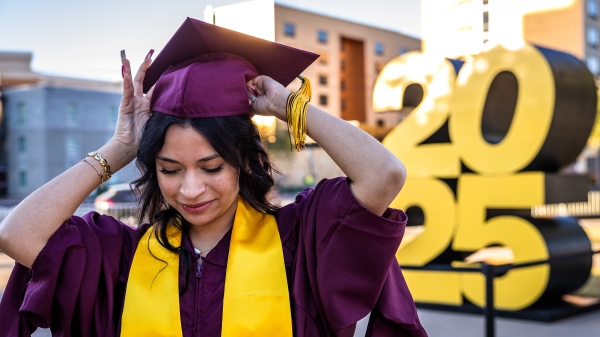ASU professor's soil mechanics expertise has had major impact on infrastructure engineering

Professor Sandra Houston will be presented her second major award from the American Society of Civil Engineers.
Professor Sandra Houston’s professional peers are honoring her career achievements with one of the most prestigious awards for important contributions to her branch of engineering.
The American Society of Civil Engineers is giving Houston its 2017 Karl Terzaghi Award, which recognizes research publications that have made a significant impact in the fields of soil mechanics, subsurface and earthwork engineering, and subsurface and earthwork construction.
Terzaghi was a pioneer in research that helped to lay the foundation for the emergence of geotechnical engineering.
Colleagues who nominated Houston for the award make the case that her work has been instrumental in advancing knowledge in her geotechnical specialty, unsaturated soil mechanics.
Her methods of analyses of soils for building structural foundations in expansive and collapsible soils have become widely used by engineers around the world, says Arizona State University Regents' Professor Edward Kavazanjian.
Houston joins Kavazanjian as a Terzaghi Award winner. He won the award in 2011. Both are civil engineering faculty members in the School of Sustainable Engineering and the Built Environment in ASU's Ira A. Fulton Schools of Engineering. Kavazanjian is the Ira A. Fulton Professor of Geotechnical Engineering.
Solving soil behavior problems
Unsaturated soils are one of the more suitable subsurface layers on which to build, but various factors that can affect conditions in those soils can present formidable engineering and construction challenges, Houston explained.
“Any time you are worried about what the addition or subtraction of water will do to the stability of soils, that’s when you need expertise in unsaturated soils mechanics,” she said. “If you are adding or taking water out of soils, you have to know how that will affect the properties and behavior of those soils that you’re essentially using as an engineering and building material.”
Dealing with the uncertainties of soil behavior and the forces that affect it “is really one of the most prevalent problems we deal with,” she added.
Her colleagues point to Houston’s long list of published research papers and conference presentations in her 30-plus years in engineering at ASU for providing reliable guidance on ways to solve such problems.
“Anyone working in this area will be aware of [Houston’s] papers and their importance,” wrote professor Gerald A. Miller in his letter nominating her for the ASCE’s award.
Miller is the associate director of the School of Civil Engineering and Environmental Science at the University of Oklahoma, where Houston earned a bachelor’s degree in civil engineering in her home state.
She went on to earn a master’s degree in civil engineering at the University of New Mexico while working for Sandia National Laboratories in Albuquerque, before earning a doctoral degree in civil engineering at the University of California, Berkeley.
Longtime leader in geotechnical field
Her work “has not only advanced fundamental understanding of problems but also improved practical solutions for reducing infrastructure distress and damages on expansive and collapsible soils,” noted professor Anand J. Puppala, associate dean of the College of Engineering at the University of Texas, Arlington.
Houston’s research over the years has attracted support or led to project collaborations involving the National Science Foundation, the U.S. Environmental Protection Agency, the American Water Works Association and Research Foundation, the Arizona Department of Water Resources and the Arizona Department of Transportation.
Her nominators for the Terzaghi Award also emphasize Houston’s record of service to her profession, in particular her work on committees of the ASCE’s Geo-Institute, for which she served a term as president.
Houston is a past president of the Arizona chapter of the ASCE’s Geotechnical Engineering Group, which has since become the Arizona Chapter of the Geo-Institute.
She received the 2004 ASCE William H. Wisely Award for her service to ASCE and the civil engineering profession. The ASCE has about 150,000 members throughout the world.
Houston is also a U.S. representative on the Technical Committee on Unsaturated Soils for the International Society for Soil Mechanics and Geotechnical Engineering, for which she served as secretary for 12 years.
“She has become, to a large extent, the spokesperson for the United States in the area of unsaturated soil mechanics,” wrote Delwyn Fredlund, a professor emeritus at the University of Saskatchewan in Canada, and a world-renowned expert on unsaturated soil mechanics.
Dedication to engineering education
Houston is to be presented the Terzaghi Award in March at the ASCE’s Geotechnical Frontiers conference in Orlando, Florida.
Some of her nominators for the award also lauded her many years of mentorship of students and young researchers in her field, along with her work to promote diversity and inclusion in the profession.
Of all the acknowledgements for her work, Houston says she was especially honored to have that mentor role recognized by receiving the Fulton Schools' Daniel Jankowski Legacy Award in 2015.
In addition to research achievements, the award is for contributions to scholarship, teaching, service and leadership in support of the educational mission of the Fulton Schools.
Her leadership positions included about 10 years as the chair of the Civil and Environmental Engineering program.
“I was thrilled to share the Jankowski award with all of the past recipients, who, like Professor Jankowski, have been so dedicated to the quality of engineering education at ASU,” she said.
More University news

Year in review: ASU's top stories for 2025
It has been a year of big announcements and bold research discoveries, as Sun Devils worked to make lives better across Arizona…

ASU launches Operation Comeback to help Arizonans finish their degrees
Arizona State University has launched a new initiative called Operation Comeback to help Arizona residents who started college at…

Fall 2025 grads encouraged to enter next chapter of life with optimism
Newly minted Arizona State University graduates were urged to help America strive toward a greater democracy as they celebrated…